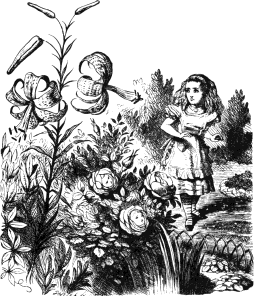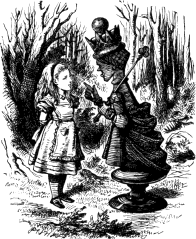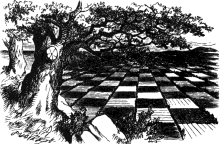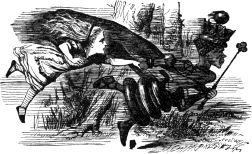The Garden of Live Flowers
Studies in Alice XIV, by Marc Edmund Jones This lesson considers the second chapter of Through
the Looking Glass and the fourteenth great principle of
wisdom in the Philosophy of Concepts as revealed
through the adventures of Alice is that interest is
founded in and on difficulty. To the unthinking man
the basic phenomenon of life often seems to be the
interminable context between sentient existence and
blind nature, or between God or the power of growth
and evolution and the devil or powers of darkness and
destruction. The commonest human effort is to
sidestep this struggle of physical being and to make
the daily and familiar routine untroublesome. For this
reason individuals on the one hand seek to support the
status quo and keep things as fixed as possible and on
the other the increased personal pressure of bondage to
any state of fixity in affairs will cause them to leap to
the opposite extreme and demand change at any price
and cost. The balance wavers between life activity and stagnation, with the latter preferred by
those who cannot see that difficulty is the very essence of stimulation and to life itself. This is a
law of nature. Years ago the raisers of poultry experimented with the machine age idea and after
calculating the exact ideal meal for the young chick proceeded to feed it to him through a nozzle,
forcibly and efficiently. But the lack of any necessity for effort in getting this ideal meal simply
produced fowl that were largely unfit for food and so they were but back to the difficulty of
scratching for it. Similarly the orange growers discovered that the crop is improved if instead of
irrigating the trees regularly they are first deprived of water until just on the point of withering
and then are given satiety and prepared for another period of difficulty. Even the trees are thus
seen to give better flavored and more satisfactory fruit if forced occasionally at least to meet an
extreme of difficulty.
This lesson considers the second chapter of Through
the Looking Glass and the fourteenth great principle of
wisdom in the Philosophy of Concepts as revealed
through the adventures of Alice is that interest is
founded in and on difficulty. To the unthinking man
the basic phenomenon of life often seems to be the
interminable context between sentient existence and
blind nature, or between God or the power of growth
and evolution and the devil or powers of darkness and
destruction. The commonest human effort is to
sidestep this struggle of physical being and to make
the daily and familiar routine untroublesome. For this
reason individuals on the one hand seek to support the
status quo and keep things as fixed as possible and on
the other the increased personal pressure of bondage to
any state of fixity in affairs will cause them to leap to
the opposite extreme and demand change at any price
and cost. The balance wavers between life activity and stagnation, with the latter preferred by
those who cannot see that difficulty is the very essence of stimulation and to life itself. This is a
law of nature. Years ago the raisers of poultry experimented with the machine age idea and after
calculating the exact ideal meal for the young chick proceeded to feed it to him through a nozzle,
forcibly and efficiently. But the lack of any necessity for effort in getting this ideal meal simply
produced fowl that were largely unfit for food and so they were but back to the difficulty of
scratching for it. Similarly the orange growers discovered that the crop is improved if instead of
irrigating the trees regularly they are first deprived of water until just on the point of withering
and then are given satiety and prepared for another period of difficulty. Even the trees are thus
seen to give better flavored and more satisfactory fruit if forced occasionally at least to meet an
extreme of difficulty.
Here is the principle of impetus or the stimulation of self-actuation. Many a hero has experienced this perhaps subconsciously but often consciously for no other reason than the desire to be acclaimed. He has sought difficulties and essayed the impossible because he gains thereby the sympathy of all who unthinkingly seek to avoid the harder roads of life. But there are real heroes who thoroughly despise such classification and seek out the greatest difficulties for no other reason than the joy gained in overcoming them for some definite and constructive purpose. The symbolism of the second chapter of Looking Glass is interesting therefore in its unique conceit of the flowers who can talk and are alive from the human conception of aliveness. When Alice is surprised at the fact that they converse with her and questions them as to how they have attained the faculty she is directed to feel the earth and to see how hard it is. She is told that the soft soil of the average garden keeps an average flower asleep and unless the plant is awake it cannot be expected to speak. Here the unconscious occult understanding of Lewis Carroll is revealed at its best in this illustration of the principles already brought out in the preceding paragraph. When life is made too soft for the individual he like the ordinary flower merely dreams his way through his years and really never speaks. There is more to articulate expression than the use of words and repetition of ideas. As the leader of the flowers explains to Alice they are willing and ready to talk when the effort is worth while. The whole procedure in the awakening of the average man is to get into his consciousness the idea of the worthwhileness of some given objective or task that will stir him to overcome difficulties to the point of the first awakening of interest. An aspirant to the Eternal Mysteries need not be conducted personally through his many initiations, nor will he be, but he must be launched or even catapulted on the path of illumination with impetus enough to make him of himself and by himself decide to press on and upward.
The achievement of imagination in the chapter, or the fourteenth
great scientific anticipation, is the revelation here of the
hypothetical nature of all principle. The student of the eternal
wisdom must learn what science at last has grasped, that it is
impossible to state any principle absolutely. In this realization
the greatest stumbling block in the study of the Philosophy of
Concepts is  removed. While to the beginner it may be stated
that the
teaching is paradoxical in order that he may be prepared for the
many seeming contradictions, this simple use of the paradox to
create necessary contrast in understanding is but the outer and
more superficial form of the fundamental fact. A principle as
stated is only true in the particular domain of its application or
statement. Science has come to expect reversal of every theory
in any real expansion of knowledge in connection with it, and scientists are little inclined to
dispute nowadays the impossibility of any thing or any idea. Researchers have too often seen
that to include more facts in any given consideration means that they quite likely will be forced
to repudiate the accepted theory. They see that theories, rather than any presence or absence of
facts, are the limiting factor in the expansion of knowledge. They have realized that theories
serve their purpose only temporarily, as in the case of scaffolding a new building, and that no
theory or principle will be of particular service unless restated outside the domain of its
postulation.
removed. While to the beginner it may be stated
that the
teaching is paradoxical in order that he may be prepared for the
many seeming contradictions, this simple use of the paradox to
create necessary contrast in understanding is but the outer and
more superficial form of the fundamental fact. A principle as
stated is only true in the particular domain of its application or
statement. Science has come to expect reversal of every theory
in any real expansion of knowledge in connection with it, and scientists are little inclined to
dispute nowadays the impossibility of any thing or any idea. Researchers have too often seen
that to include more facts in any given consideration means that they quite likely will be forced
to repudiate the accepted theory. They see that theories, rather than any presence or absence of
facts, are the limiting factor in the expansion of knowledge. They have realized that theories
serve their purpose only temporarily, as in the case of scaffolding a new building, and that no
theory or principle will be of particular service unless restated outside the domain of its
postulation.
 The symbolism of Alice's approach to things by separation
is wholly delightful as well as epochal. She seeks to get to
the hill in order to observe the country and to orientate
herself, but every walk and path leads her back to the house.
This is quite characteristic of life. A watched pot never
boils in the proverb of unknown authorship and an objective
sought wholly objectively is seldom gained. The furtherest
way about's the nearest way home is the anonymous
statement in John Ray's collection of English proverbs of
1670. The hill is eternally the symbol for inspiration and so there is the Sermon on the Mount.
The house is equally established as a symbol for the known or familiar realm of being. As long
as man seeks to walk out to his inspiration he will find himself headed back to himself but if he
is willing to approach himself and those things near at hand as the basis of all real understanding,
then only will he arrive on his hill and there meet the Red Queen or active and conscious
intelligence of his being.
The symbolism of Alice's approach to things by separation
is wholly delightful as well as epochal. She seeks to get to
the hill in order to observe the country and to orientate
herself, but every walk and path leads her back to the house.
This is quite characteristic of life. A watched pot never
boils in the proverb of unknown authorship and an objective
sought wholly objectively is seldom gained. The furtherest
way about's the nearest way home is the anonymous
statement in John Ray's collection of English proverbs of
1670. The hill is eternally the symbol for inspiration and so there is the Sermon on the Mount.
The house is equally established as a symbol for the known or familiar realm of being. As long
as man seeks to walk out to his inspiration he will find himself headed back to himself but if he
is willing to approach himself and those things near at hand as the basis of all real understanding,
then only will he arrive on his hill and there meet the Red Queen or active and conscious
intelligence of his being.
 The law of applied psychology, or the fourteenth big
idea for the solution of personal problems, is brought
out here in the technique of progress. Man must run
to keep in the same place or to stay alive, and the
whole basis of real progress lies in this gracious
acceptance of the idea of progressing constantly to
some certain extent in order to be ready to progress
further or in eternal fact. He must run twice as hard to
get anywhere. The making of the curtsy while
thinking is one of the finest suggestions in the book since man by polite conformity to things as
they are escapes opposition in consciousness and is enabled to think or to find and establish
himself within. Life is a chess game with squares marked out by rivers or channels of activity
and hedges or prejudices as established boundaries of consciousness, and each pawn must
conform to conditions or maintain his place in the scheme of things by fitting into the game. It
is the queen who is able to magnify everything, but the pawn by its conformity may become
queen. The student must learn to BE COURTEOUS WHEN IN DOUBT or to play hypocrite in
a sense or constructively until sure within himself. When faults are seen in man he is in fault,
although not necessarily in the thing seen, and he must reorientate himself.
The law of applied psychology, or the fourteenth big
idea for the solution of personal problems, is brought
out here in the technique of progress. Man must run
to keep in the same place or to stay alive, and the
whole basis of real progress lies in this gracious
acceptance of the idea of progressing constantly to
some certain extent in order to be ready to progress
further or in eternal fact. He must run twice as hard to
get anywhere. The making of the curtsy while
thinking is one of the finest suggestions in the book since man by polite conformity to things as
they are escapes opposition in consciousness and is enabled to think or to find and establish
himself within. Life is a chess game with squares marked out by rivers or channels of activity
and hedges or prejudices as established boundaries of consciousness, and each pawn must
conform to conditions or maintain his place in the scheme of things by fitting into the game. It
is the queen who is able to magnify everything, but the pawn by its conformity may become
queen. The student must learn to BE COURTEOUS WHEN IN DOUBT or to play hypocrite in
a sense or constructively until sure within himself. When faults are seen in man he is in fault,
although not necessarily in the thing seen, and he must reorientate himself.

Sabian.org





